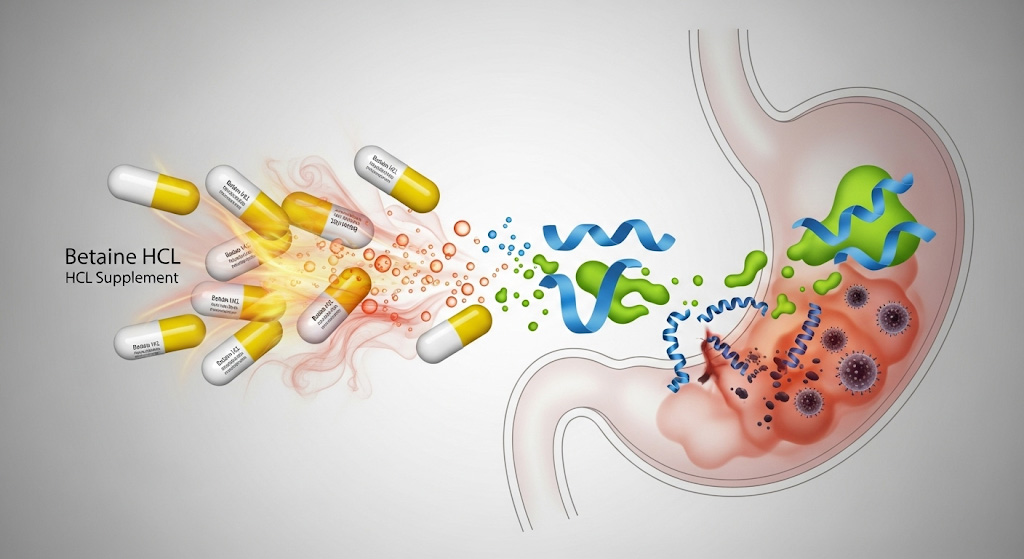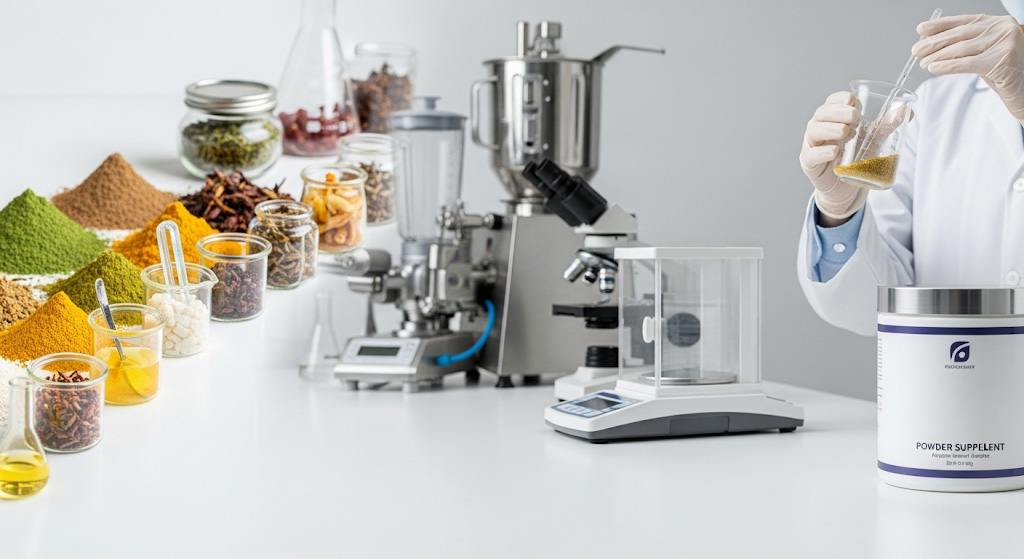Hydrochloric acid (HCl) is a naturally occurring, highly acidic component of gastric juice produced by parietal cells in the stomach lining. It plays a foundational role in the initial stages of digestion, acting as the stomach's primary defense and processing agent. When the body's natural production of HCl is insufficient, a condition known as hypochlorhydria, it can lead to a cascade of digestive issues and potential nutrient deficiencies. This is where HCl dietary supplements, often containing betaine HCl or glutamic acid HCl, come into play, aiming to replenish stomach acid levels and support digestive function.

This article will delve into the critical functions of hydrochloric acid in digestion, explore the implications of low stomach acid, discuss how HCl supplements work, and provide important considerations for their use.
The Crucial Functions of Hydrochloric Acid in Digestion
Hydrochloric acid performs several indispensable roles in the stomach, creating a highly acidic environment essential for proper digestion and protection:
-
Protein Breakdown (Protein Denaturation): The highly acidic environment created by HCl causes proteins to unfold or "denature." This crucial step exposes the protein's peptide bonds, making them accessible for the enzyme pepsin. HCl is also vital for converting the inactive enzyme precursor pepsinogen into its active form, pepsin. Pepsin then begins to break down large protein molecules into smaller polypeptides, preparing them for further digestion in the small intestine.
-
Pathogen Defense: The stomach's extreme acidity acts as a formidable barrier against harmful bacteria, viruses, fungi, and parasites that may be ingested with food or water. This low pH environment effectively sterilizes food, significantly reducing the risk of gastrointestinal infections.
-
Nutrient Absorption: HCl is critical for the absorption of several vital micronutrients:
-
Vitamin B12: HCl is necessary to release Vitamin B12 from the proteins it's bound to in food. It also facilitates the formation of intrinsic factor, a protein required for B12 absorption in the small intestine.
-
Minerals: It helps solubilize essential minerals like iron, calcium, magnesium, and zinc, converting them into forms that can be more readily absorbed in the small intestine.
-
-
Stimulation of Digestive Processes: As the acidic chyme (partially digested food) leaves the stomach and enters the duodenum (the first part of the small intestine), its acidity triggers the release of important digestive hormones. These hormones, such as secretin and cholecystokinin (CCK), then signal the pancreas to release digestive enzymes and bicarbonate (to neutralize the acid), and the gallbladder to release bile, thereby coordinating the next phases of digestion.
-
Closing the Esophageal Sphincter: Adequate stomach acid helps ensure the proper functioning of the lower esophageal sphincter (LES), the muscular valve that separates the esophagus from the stomach. A sufficiently acidic stomach signals the LES to remain closed, preventing stomach contents and acid from refluxing back into the esophagus, which can cause heartburn (Gastroesophageal Reflux Disease or GERD).
Understanding Low Stomach Acid (Hypochlorhydria)
Hypochlorhydria, or insufficient stomach acid production, is a surprisingly common condition that can arise from various factors:
-
Aging: Natural stomach acid production tends to decline with age, often beginning around age 40.
-
Medications: Proton Pump Inhibitors (PPIs) and H2 blockers, commonly prescribed for acid reflux or ulcers, drastically reduce stomach acid production. While effective for their intended purpose, long-term use can lead to hypochlorhydria.
-
Chronic Stress: Chronic stress can impair various bodily functions, including digestive enzyme and acid production.
-
Nutrient Deficiencies: Deficiencies in nutrients essential for HCl production, such as zinc and B vitamins, can contribute to low stomach acid.
-
Helicobacter pylori Infection: This common bacterial infection can lead to inflammation and damage to the stomach lining, impairing acid secretion.
-
Autoimmune Conditions: Autoimmune atrophic gastritis, where the body's immune system attacks parietal cells, is a more severe cause of chronic hypochlorhydria, often leading to achlorhydria (virtually no stomach acid).
-
Gastric Surgery: Procedures that alter stomach anatomy can affect acid production.
Symptoms of Low Stomach Acid
Many symptoms of hypochlorhydria paradoxically mimic those of high stomach acid, leading to misdiagnosis. Common symptoms include:
-
Heartburn and Acid Reflux (GERD): When stomach acid is too low, the LES may not close properly, allowing what little acid is present (or even just undigested food) to reflux into the esophagus.
-
Bloating, Gas, and Belching: Undigested food ferments in the stomach and small intestine, producing gas.
-
Feeling Full or Heavy After Meals: Food sits in the stomach longer due to inefficient breakdown.
-
Undigested Food in Stool: A clear sign that food isn't being properly broken down.
-
Nutrient Deficiencies: Especially B12, iron, calcium, magnesium, and zinc, leading to symptoms like fatigue, anemia, brittle nails, and hair loss.
-
Frequent Gastrointestinal Infections: Due to the compromised acid barrier.
-
Bad Breath (Halitosis): Can result from bacterial overgrowth and fermentation in the gut.
How HCl Dietary Supplements Work
HCl dietary supplements primarily contain betaine HCl (a compound of betaine and hydrochloric acid) or less commonly, glutamic acid HCl. These supplements are designed to temporarily increase the acidity of the stomach, thereby mimicking the function of naturally produced HCl.
When taken with a meal, betaine HCl releases hydrochloric acid into the stomach, which then:
-
Lowers Stomach pH: This makes the stomach environment more acidic, crucial for activating pepsinogen to pepsin.
-
Supports Protein Digestion: The activated pepsin can then effectively break down proteins.
-
Enhances Nutrient Release: The acidic environment aids in releasing Vitamin B12 from food and solubilizing minerals for absorption.
-
Restores Acid Barrier: Helps to re-establish the stomach's protective barrier against ingested pathogens.
-
Promotes LES Closure: Can help signal the lower esophageal sphincter to close more effectively, reducing reflux symptoms.
It's important to understand that HCl supplements are not a cure for underlying conditions causing low stomach acid, but rather a temporary measure to aid digestion when natural production is insufficient.
Important Considerations for Using HCl Dietary Supplements
While potentially beneficial for individuals with verified low stomach acid, HCl supplements are not for everyone and must be used with caution.
-
Diagnosis is Key: Do not self-diagnose low stomach acid. Many digestive symptoms overlap. It's crucial to consult a healthcare professional (doctor or gastroenterologist) for proper diagnosis through tests (e.g., Heidelberg capsule test) or a supervised trial. Taking HCl when you have sufficient or high stomach acid can be harmful.
-
Contraindications:
-
Active Peptic Ulcers: HCl supplements can irritate or worsen existing stomach or duodenal ulcers.
-
Gastritis: If you have acute or severe inflammation of the stomach lining, adding more acid can cause pain and further irritation.
-
NSAID Use: Do not take HCl supplements if you are regularly using Non-Steroidal Anti-Inflammatory Drugs (NSAIDs) like ibuprofen, naproxen, or aspirin. These medications can damage the stomach lining, and adding HCl can increase the risk of bleeding or ulcer formation.
-
Esophageal Sensitivity: Individuals with a very sensitive esophagus (e.g., from long-term severe reflux not due to low acid) might experience increased burning.
-
-
Dosage and Timing:
-
Start Low, Go Slow: If advised by a professional, start with a very low dose (e.g., one capsule containing 600-650 mg of betaine HCl) at the start of a protein-containing meal.
-
Listen to Your Body: A common indicator of sufficient acid is a mild warming sensation in the stomach. If you feel a burning sensation or discomfort, reduce the dose or stop taking it.
-
Only with Protein Meals: HCl should only be taken with meals that contain a significant amount of protein, as protein digestion is where it's most needed. Avoid taking it with light, carbohydrate-only meals or on an empty stomach.
-
-
Side Effects: The most common side effect is increased heartburn or indigestion if the dose is too high or if taken by someone with sufficient acid. Less common side effects can include stomach pain or nausea.
-
Interaction with Medications: HCl supplements can affect the absorption of certain medications, particularly those that are pH-sensitive or absorbed more readily in a certain pH environment. Always discuss all your medications with your doctor before starting HCl.
-
Nutrient Consideration: While HCl aids in mineral absorption, sometimes the issue is simply insufficient intake. Ensure your diet is rich in zinc and B vitamins.
Choosing an HCl Dietary Supplement
If you and your healthcare provider decide that an HCl supplement is appropriate for you, here's what to look for:
-
Betaine HCl: This is the most common and effective form used in supplements.
-
Enzyme Combination: Many HCl supplements are combined with pepsin or other digestive enzymes. This can be beneficial as HCl activates pepsin, and the presence of additional enzymes (like proteases, amylases, lipases) can provide more comprehensive digestive support.
-
Dosage: Betaine HCl is typically found in dosages ranging from 300 mg to over 1000 mg per capsule. Start with a lower dose under professional guidance.
-
Quality and Purity: Choose reputable brands that provide:
-
Third-party testing: Ensures the product contains what it claims and is free from contaminants.
-
Good Manufacturing Practices (GMP) certification: Indicates adherence to strict quality control standards.
-
Transparency: Clear labeling of all ingredients.
-
-
Formulation: Capsules are generally preferred over tablets, as they dissolve quickly to release the HCl. Some are specifically designed for delayed release to minimize stomach irritation.
Conclusion
Hydrochloric acid is an unsung hero of the digestive system, playing a fundamental role in breaking down proteins, defending against pathogens, and facilitating nutrient absorption. When the stomach's natural HCl production falters, leading to hypochlorhydria, a range of uncomfortable digestive symptoms and nutritional deficiencies can arise. HCl dietary supplements, particularly those containing betaine HCl, offer a targeted approach to temporarily restore stomach acidity and support efficient digestion.
However, using HCl supplements requires a precise understanding of their function and careful consideration of individual health status. They are not a universal cure-all for digestive issues, and improper use can lead to adverse effects. Always remember, the decision to use HCl supplements should be made in consultation with a qualified healthcare professional who can accurately assess your digestive health, rule out contraindications, and guide you on appropriate dosage and monitoring. With careful and informed use, HCl supplements can be a valuable tool in managing low stomach acid and fostering improved digestive well-being.
Authoritative References and Further Reading:
To ensure you have access to credible and scientifically-backed information regarding HCl dietary supplements and stomach acid, please refer to the following authoritative sources:
-
National Institutes of Health (NIH) – Office of Dietary Supplements (ODS):
-
Dietary Supplements: What You Need To Know (Provides general guidance on dietary supplements)
-
-
Mayo Clinic:
-
Stomach acid: What it does and how to know if you have too much or too little (Although the title focuses on excess, it often touches on the balance and function)
-
Pernicious Anemia (Related to Vitamin B12 absorption, which can be affected by low HCl)
-
-
Harvard Health Publishing:
-
Understanding digestive enzymes (Often discusses HCl's role in activating pepsin)
-
-
PubMed / National Library of Medicine: (A vast resource for peer-reviewed scientific literature)
-
Search terms like "hypochlorhydria symptoms," "betaine HCl digestion," "stomach acid nutrient absorption" will yield numerous relevant studies and reviews.
-
-
American College of Gastroenterology (ACG):
-
Patient Information: Dyspepsia (Indigestion) (General information on indigestion, which can be related to HCl levels)
-





